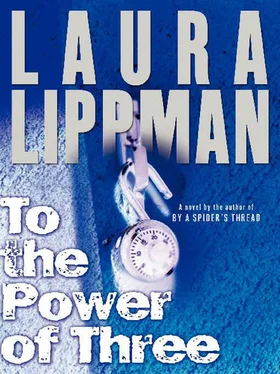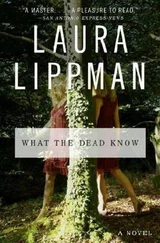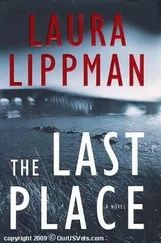And then she realized her father was sitting in a chair in the corner, his chin resting on his chest, his bald spot staring at her. A few strands of hair, so much darker and glossier than her own, clung to his skin, but most of it had fallen back to the side from which it had been coaxed so painstakingly. Her father’s comb-over was a source of great embarrassment to Josie, but her mother had forbidden her to tease him about it. “You can say all the hateful things you want about my appearance,” her mother had said, “but don’t you dare pick on your father. He works so hard.”
He works so hard. Her mother was always saying that, as if it should have some special significance to Josie. He works so hard. Translation: You and your brothers need too much. You can’t imagine how hard it is to commute. Translation: We moved out here just for you. The strange thing was, Josie’s mom worked hard, too, with virtually the same commute, but she sought no sympathy for herself. Josie was left with the sense that her mother was happy to make the sacrifices that children required, but her father had surrendered something infinitely more precious.
What, exactly? What else could her father have wanted from life? Here he was, asleep in front of her, murmuring, literally dreaming. Yet Josie could not imagine her father’s dreams. For all her mother’s complaints, he had a job he genuinely liked at Hopkins Applied Physics Lab, pretty much nirvana for a onetime math nerd. (He wrote code. At least that’s what Josie thought her father did. She had always been a little vague on the details, even after going to the office with him on Take Your Daughters to Work Day, where the one thing that kept Josie’s interest was the tray of doughnuts. She was only eleven.) He adored Josie’s mother to a degree that was almost embarrassing, and he was just as affectionate with his children. If she had to guess, Josie would say her father was happy, although she didn’t know why.
Josie’s father had been a musician in college, playing guitar in a band. That was how her parents met, at a keg party in the middle of a field at Grinnell College. “His band was terrible, just terrible,” her mother said. “Although they did a very good punk version of ‘ Pleasant Valley Sunday.’” Her father still had a guitar and played in the garage on the rare weekends when there was nothing else to do. He wasn’t very good. Josie could recognize the chords he picked out only because some Glendale guys listened to a lot of vintage music-the Clash, the Rolling Stones, that sort of thing. Every now and then, her father would start plucking out the derder opening of what Josie’s mother called his signature song, and her mother would abandon whatever she was doing and go out into the garage and dance to the Monkees’ idea of what was subversive, all those years ago-to Josie’s utter embarrassment, although her brothers were still young enough to think it was funny. There was something so…well, teenage about her parents’ devotion to each other. Her mother especially reminded her of the Glendale girls who went steady with the same boys all four years. Although, come to think of it, those girls always looked grim and exhausted, while Josie’s mom beamed as if she still couldn’t believe that Susie Cobb from Janesville, Wisconsin, had landed worldly Vik Patel, the math whiz who played in a band, tossing his then full, dark hair back from his face, smiling his brilliant smile, so white in contrast to his walnut-colored skin.
“I couldn’t believe someone so worldly was interested in me,” her mother always said. Josie, who had learned the word “uxorious” when studying for the SATs, asked her English teacher if there was a corresponding word for a woman who worshipped her husband. Mrs. Billings had shrugged. “I guess it was assumed that wives were supposed to be that way about their husbands, that it was the natural order of things.” So sexist, Perri had pointed out.
But being goony in love with your spouse clearly wasn’t the natural order, not based on what Josie saw around her in Glendale. Perri’s folks were nice enough, but hardly romantic. Mrs. Kahn did that humorous, put-upon thing, claiming that Dr. Kahn was terrible to her, but it was clearly all for show. As for Kat’s parents-they had always been a little snappish with each other, even before the divorce. Kat may have been shocked when her parents broke up, but Josie and Perri had seen it coming from a long way off. Josie had always been keen to escape the Hartigan house, despite its wealth of toys and gadgets, making a beeline for the patch of trees and the old creek at the far end of the Hartigans’ property. Yes, Kat had the coolest house but the worst parents. Josie had the worst house, and her parents were a close second to Perri’s. Perri had the second-best house and the best parents, because they simply never got mad. Perri could do no wrong as far as her parents were concerned, although they did have very high standards in terms of effort. The only time that Perri had gotten in trouble for a report card was when she had gotten a 2 in effort.
But it was wrong, keeping score, now that Kat was dead. Dead for no reason. How could this have happened? Perri was crazy, an actual lunatic. Had she always been this way? Not when they were little, of course. No one’s insane in the third grade, except for serial killers, the boys who blow up cats and set dogs on fire. It was only in the past year that Perri had gotten so weird, and every-one-Josie included-had chalked that up to her obvious jealousy of Kat.
Still, she was Perri . The smart one, the funny one, the one with the best ideas. She was the one who had dropped them, although the school didn’t spin it that way, couldn’t see how much Kat and Josie missed Perri when she distanced herself from them last fall-suddenly, viciously, without any explanation. Just because they were two and she was one didn’t make it any easier to bear. Especially given the fact that Kat was as strangely silent on the topic as Perri was.
The memory of how her two friends had looked, after, rushed over Josie, and she glanced around frantically. There was a plastic trash can near her bed, but she had to lean out at a perilous angle. She tried to throw up silently, but it was too hard maintaining that posture while vomiting, and the sound of retching woke her father.
“Oh, Josie.” Her father tucked her hair behind her ears, fetched a towel from the bathroom, and wiped her face. He was still in his office clothes-the embarrassing short-sleeved shirt and polyester old-man pants-and his BO was a little funky. He must have sweated a lot today. Her father’s sweat didn’t smell like anyone else’s-it wasn’t worse, just different-and Josie had always feared that it had something to do with being Indian, that her own perspiration would have this same foreign undercurrent. So far it didn’t, but you never knew.
“I was worried the codeine and the sedative would be hard on your stomach, but the doctor kept saying he didn’t want the pain to get ahead of itself. How’s the foot?”
“It feels kind of…fiery.”
“Yeah. There may be some bone chips in there. They took the bullet out, but they still need an orthopedic surgeon to go over the X-rays.”
“Am I going to be okay? I mean, totally normal, so I can-Dad, what about my scholarship? If I can’t do acrobatics, if I end up with a limp…Dad, Dad-”
“You’re the lucky one, Josie. We’re the lucky ones. That’s all that matters for now.”
Her father’s voice became thick and strange, as if he might begin to cry, an idea that made Josie even more frantic. “Dad…Dad…Dad.”
“What, Josie?”
But she didn’t know how to deny him his tears, so she said instead, “Can I have a Sprite or a ginger ale to settle my stomach?”
Читать дальше












